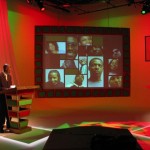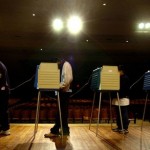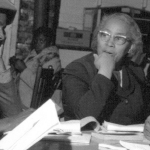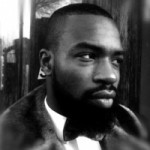Voting as a Radical Act
By: Isaiah M. Wooden and Darnell L. Moore
In a different presidential election year, 2004, Comedy Central’s ever-popular sketch series, Chapelle’s Show, featured a boundlessly funny segment called, “I Know Black People.”1 Inspired by a conversation with a white viewer who suggested that the show was perhaps offensive to its black audiences, the segment convenes a motley crew of contestants “who claim to know black people”—including a white African-American Studies professor, a police officer, a writer, a barber, and a social worker—and makes a game of testing their knowledge of black culture.  The questions posed range from the astute to the absurd—from “Why did black people distrust Ronald Reagan?” to “Is pimpin’ easy?” And even Chappelle, who performs the role of host, is seemingly astounded at various moments by the honesty and earnestness with which the contestants grapple with them. As the segment nears its end, the host asks one final question: “How can black people rise and overcome?” He declares myriad responses as “correct” or “acceptable”: “Can they?”; “Reparations.”; “There’s a complex answer there…”; “Staying alive.”; “Stop cutting each other’s throats.” One answer, however, which comes courtesy of the police officer, activates the buzzing sound that indicates an incorrect reply: “Get out and vote.” The studio audience chuckles heartily while Chappelle shakes his head in feigned disappointment at the response. The ability of voting to radically intervene, particularly in the lives of black folk, is deemed laughable and, indeed, as the ultimate sign of deficient knowledge of black life. The act of voting is rendered a punchline.
The questions posed range from the astute to the absurd—from “Why did black people distrust Ronald Reagan?” to “Is pimpin’ easy?” And even Chappelle, who performs the role of host, is seemingly astounded at various moments by the honesty and earnestness with which the contestants grapple with them. As the segment nears its end, the host asks one final question: “How can black people rise and overcome?” He declares myriad responses as “correct” or “acceptable”: “Can they?”; “Reparations.”; “There’s a complex answer there…”; “Staying alive.”; “Stop cutting each other’s throats.” One answer, however, which comes courtesy of the police officer, activates the buzzing sound that indicates an incorrect reply: “Get out and vote.” The studio audience chuckles heartily while Chappelle shakes his head in feigned disappointment at the response. The ability of voting to radically intervene, particularly in the lives of black folk, is deemed laughable and, indeed, as the ultimate sign of deficient knowledge of black life. The act of voting is rendered a punchline.
Chapelle’s Show is often lauded for its nuanced commentary on and metacritical analysis of various aspects of modern life. We return to the “I Know Black People” sketch here to not only illuminate the ways the show continues to find resonances in the present, but also to consider how the sketch at once extends and, significantly, critiques the cynicism and ambivalence that often threatens to engulf the act of voting within contemporary discourse. Perhaps what makes the police officer’s “go out and vote” reply so humorous, beyond its uncritical deployment of voting as a cure-all solution, is that it bespeaks a certain naiveté about the ability of electoral politics to effect social and political change. There is a shade of shade in the audience’s laughter and Chappelle’s “I’m sorry. I’m sorry. That is incorrect.”  The subtext is that black folk know better: voting does not necessarily lead to rising or overcoming. Implicit in the joke, however, is a suggestion that the act of voting is completely devoid of meaning—symbolic and material—and that, indeed, as an act, voting carries little, if any force. This, we argue, reduplicates a view, ostensibly maintained by some in the present, which obscures the act of voting’s subversive history and potential. Indeed, our larger objective here is to contemplate whether the act of voting might be recuperated as a radical act.
The subtext is that black folk know better: voting does not necessarily lead to rising or overcoming. Implicit in the joke, however, is a suggestion that the act of voting is completely devoid of meaning—symbolic and material—and that, indeed, as an act, voting carries little, if any force. This, we argue, reduplicates a view, ostensibly maintained by some in the present, which obscures the act of voting’s subversive history and potential. Indeed, our larger objective here is to contemplate whether the act of voting might be recuperated as a radical act.
On Radicalisms
But to arrive at a conclusion regarding the radicality of voting, we must first attend to the question: what, then, is radicalism? Is radicalism akin to revolution and, if so, which type: political, cultural, or martial? Is radicalism evidenced through progressive organizing or leftist politicking; deliberately evading federal and state taxes or financially supporting elected officials whose platforms align with our “progressive” causes; occupying Wall Street or working on Wall Street while purposefully living/shopping on, say, Malcolm X Boulevard in neighboring Brooklyn; refusing to vote in an election or eschewing electoral politics altogether? Whose definition of “radical” act or politics are we to subscribe? Are we to hearken to the words of Saul Alinsky, author of the now widely read 1971 work Rules for Radicals, who wrote:
But the answer I gave the young radicals seemed to me the only realistic one: “Do one of three things. One, go find a wailing wall and feel sorry for yourselves. Two, go psycho and start bombing — but this only swings people to the right. Three, learn a lesson. Go home, organize, build power and at the next convention, you be the delegates.
Or, does radicalism rely upon “grasping things at the root” as Angela Davis once remarked?
Our point is: there exists no monolithic or universal radicalism that prescribes or organizes the assorted ways of being political in the lives of those who push against the bounds of majority and conventional-thought, those who seek to vision and build a world where social and economic inequity is upturned. And because there is no one definition for the “radical”, there is, therefore, no one way to be radical. Thus, we are using radicalisms here to invoke the various methods and politics that human and institutional bodies employ to decenter and redistribute power to the margins, if not blur the boundaries between the edges and center altogether; to smudge away the residue of contemptible state practices and policies; to engage the work of social, economic, and political justice; and, significantly, to remake the world.
On Voting as a Radical Act
It is 2012, after all, and not 1870 when the Fifteenth Amendment of the U. S. Constitution was ratified to prohibit states from denying citizens their right to vote based on “race, color, or previous condition of servitude.” It is 2012, indeed, and not 1965 when the Voting Rights Act was passed as a means of outlawing biased voting practices seeking to prohibit African Americans from exercising their 15th Amendment right. And, yes, it is 2012 and not 1920 when the Nineteenth Amendment to the U.S. Constitution was ratified ensuring that United States citizens would not be denied the right to vote based on sex. And, yet, in 2012 voter suppression practices continue to be enacted in states across the country serving as a lingering reminder of the power of the vote, especially as it relates to votes cast by non-white and non-male citizens.2
If, in fact, voting is so outmoded and non-radical, then those who seek to suppress the vote of the very citizens whom the 15th and 19th Amendments and Voting Rights Act of 1965 seek to protect would not be exerting an ever expanding force in 2012. Votes matter, yes. But, voting—a hard-won right for the black, the brown, and the female citizen—matters too. There would be no need to disrupt a process on the part of powers and principalities if voting did not matter in the lives of the marginalized.
 Thus, we consider voting a right that troubles power—one that is connected to an historical legacy of anti-racist and anti-sexist struggle—and a form of resistance to power structures that would deny any citizen’s right to vote. Indeed, TFW Collective Member, Theresa Runstedtler, making a similar point in her piece “What Does Democracy Look Like?”, considers a genealogy of black women who understood the significance of voting. She writes:
Thus, we consider voting a right that troubles power—one that is connected to an historical legacy of anti-racist and anti-sexist struggle—and a form of resistance to power structures that would deny any citizen’s right to vote. Indeed, TFW Collective Member, Theresa Runstedtler, making a similar point in her piece “What Does Democracy Look Like?”, considers a genealogy of black women who understood the significance of voting. She writes:
The likes of Septima Clark, Ella Baker, and Fannie Lou Hamer (and so many others) always understood that voting was just one strategy of many. Voting was just the beginning. They worked to cultivate grassroots leaders to collectively push for change in their communities from the bottom up. They knew that politicians would only do what their constituents forced them to do. They had to come up with their own visions of what freedom and equality meant to them.
So, yes, refusing to vote, disconnecting oneself from the electoral political process, and/or denying the state its power through the willful separation from state practices (i.e. tax evasion; census count; et cetera) may be radical acts for some; however, voting, engaging the electoral process, and participating in state practices may be radical acts for others. There is no monolithic radicalism after all.
But if non-voting is radical and voting is an act of jest then the joke really is on the many black, brown, non-English speaking, non-male, non-literate, differently abled, the transportation limited , court adjudicated, homeless, and other bodies who have had to fight to exercise their right to vote and those who continue to fight (like those within the walls of our country’s many state prisons) today. Perhaps, then, the police officer was onto something.
_____
1. The authors would like to thank Jakeya Caruthers for her inspiration and love of Dave Chappelle.
2. According to Voting Rights Watch 2012 hosted by The Nation, for example: A contracted employee of the Republican Party of Virginia was arrested for trashing a bag of completed voter registration cards. Members from the Northern Cheyenne, Crow, Gros Ventre and Assiniboine tribes and nations in Montana are suing the state because of the state’s failure to provide early voting on the reservations. Maricopa County’s Election Department in Arizona printed the wrong election date—only in Spanish—on cards it’s issued to voters before realizing its error and making corrections.
______________________________________________
 Darnell L. Moore is a writer/poet and activist who lives in Bedstuy, Broooklyn, NY and hails from Camden, NJ. He is a member of The Feminist Wire Editorial Collective.
Darnell L. Moore is a writer/poet and activist who lives in Bedstuy, Broooklyn, NY and hails from Camden, NJ. He is a member of The Feminist Wire Editorial Collective.
 Isaiah M. Wooden is a writer, performance-maker, and doctoral candidate in Theater and Performance Studies at Stanford University. He was born and raised in the great city of Baltimore, MD.
Isaiah M. Wooden is a writer, performance-maker, and doctoral candidate in Theater and Performance Studies at Stanford University. He was born and raised in the great city of Baltimore, MD.




0 comments